Interesting things can happen when educators educate educators, especially when they effectively exploit the power of Open Badge eCredentials to encourage and recognize reflective learning and the authentic application of learning to their ongoing professional practice.
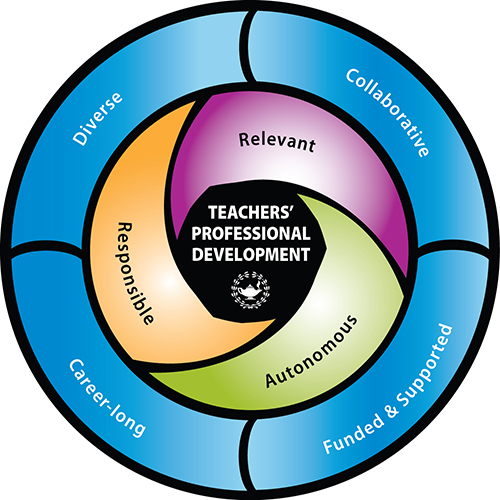
The Professional Development Lens – BC Teachers Federation (Depiction does not imply endorsement of Open Badges)
K12 teachers represent a prime early adopter group on the Technology Adoption Life Cycle that I keep on talking about in this blog. eCredentials based on Open Badges are rapidly gaining traction for PD in the US, at national, state and local levels.
There’s still a strong flavour of ICT skills, (e.g. ISTE), but I’m also seeing plenty about other 21st Century Skills and some really interesting professional learning opportunities are starting to emerge in areas that are totally unrelated to technology, such as ethics and cultural competence.
I haven’t seen a lot up here in Canada yet, though I am piloting badge systems with one teacher support organization in Quebec, and I know of at least one other initiative in that province. (Feel free to comment below if you have news about PD badging in other provinces in Canada or other countries.)
OK, so why are Open Badge eCredentials so popular with this class of professional?
Open Badges can make PD visible
Not all PD is created equal; we know that content is not learning and that attendance is not engagement. The difference between learning inputs and learning outcomes can be pretty significant.
Open Badges contain information that goes beyond title and description: they include criteria, skills framework alignment (soon to become even better) and even evidence. This transparency communicates:
- new opportunities for learning
- recognition of past learning achievements, potentially right down to the level of *how* that learning was achieved by the individual
This means that Open Badges provide a structured language to evaluate new learning opportunities and assess past learning.
I’m very impressed by the methodologies I see in at least two of the educator PD systems that I’ve researched: Digital Promise and PD Learning Network, both based in the US.
In one, I see that teachers pre-assess to benchmark their starting point, then engage with new content to fill perceived gaps, then prepare targeted evidence packages for assessment that are aligned with skills frameworks. Their evidence packages are evaluated by trained assessors using transparent rubrics. If the first attempt is unsuccessful, teachers are given helpful feedback and encouraged to try again until they are successful.
In another, reflection on content is not enough: teachers are asked to reflect on how they have applied their learning in practice, providing evidence of its impact on their students.
Wow. Can you say Donald Schön?
All this can be learned from badge information on their websites and is reflected in the eCredentials earned.
Open Badges support individualized learning pathways
What makes badge systems so well suited to skills wayfinding?
- Open Badges are modular
- Bite-sized chunks of learning can be consumed in smaller sessions, even down to the level of Bernard Bull’s brainstormed 5-minute “micro-training” episodes
- Smaller chunks of learning can be “stacked”, or combined into larger chunks that have more “weight”. This can be tightly designed by the issuing organization, or looser and more learner driven. Even better, issuers can decide to recognize badges from other issuers, either at par, or maybe in combination with other evidence, if the match is not perfect.
- Stacked or sequenced badges (mapped pathways) can be recommended, but they can also be created by examining the pathways of one or more role models
- Open Badges can support multiple levels of depth and engagement
As an example, Open Badges for PD topic can attest to:- Simple consumption (and assessed comprehension?) of information about that topic
- Better: reflection on the topic, both “in practice” and “on practice”; at the time of the learning episode, or also at various times after
- Better still: creation of new learning content on the topic
- Or even: a coaching or mentoring role on the topic
- Open Badges and Badge Pathways can be learning contracts
- Learners can explicitly map out “personal quests” or pathways, aligned to standards and outcomes for more personalized learning. These pathways can be negotiated in advance with a recognition body, or be completely autonomous. This approach moves us away from tightly-scripted LMSs and MOOCS and moves us further into OER/OEP territory. (OER= Open Educational Resources; OEP= Open Educational Practices)
Open Badges can connect expertise and knowledge across networks
Learners can become leaders over time. As Noah Geisel @SenorG said in a Twitter #BadgeChatK12 on Teacher PD last August:
By sharing their Badges, colleagues know who to seek out for help (because they can see who is “expert”)
This is one of the basic tenets of Connectivism: the learning is in the *network*, not in any one resource or person.
And what if that that learner turned leader starts publishing their own learning opportunities and issuing their own badges? This could be as simple as adapting an existing badge to a new context, such as a different jurisdiction’s curriculum and creating a learning cluster around that, or it could be something completely new.
The notion of using Open Badges to more effectively disseminate knowledge and capture emergent expertise across networks was explored by Darren Cambridge a few ePICs ago in London:
But an echo came to me from an interesting source: someone in a Fortune 100 company who is actively exploring better ways to foster expertise in multiple domains across multiple global networks.
The same thinking applies for communities of educators: Open Badges can ease the spread of useful knowledge organically. Top down control of Knowledge Management can be a dragging anchor, especially in rapidly evolving knowledge domains.
Open Badges can support collaboration and collegiality
Open Badges can foster communities of professional learners. This can involve badge groups (such as on the BadgeList platform), distributed assessment networks (such as #OB101 on P2PU), peer assessment, and more informal learning groups helping each other achieve their outcomes. Carla Casilli (@carlacasilli) recently mentioned @P2PU’s Learning Circles in this context. These are online course support groups, but could also be organized around books, or even skills frameworks.
In Canada, educator organizations such as the BC Teachers Federation (a union) have published guidance for their members around school inquiry groups and collaborative conversations. Extending this to badge learning challenges and achievements isn’t much of a stretch.
Open Badges are engaging
According to this recent study by the Friday Institute at the University of North Carolina, 97% of teachers who earned credentials in their program wanted to earn more. This doesn’t surprise me. I’ve earned a few myself and I’d like to earn more! Even more addictive is when badges lead in a certain direction, or add up toward a desired goal.
Open Badge eCredentials can help advance careers
PD Learning Network, one of the badging systems I mentioned above will soon be offering university level credits with their badges as a partnership with a particular university (TBA). They’re quick to state that “the university does not guarantee units will be accepted by any entity“, but I’m starting to see some potential here for laddering “sufficiently weighty” badges into Post Bac and Masters programs.
Certainly, Open Badge eCredentials support reporting requirements for Continuing Competence, even if they do have to report them in “clock hour” terms.
In addition, being recognized for competence in a particular area can qualify you for new job assignments, even promotion. However, mileage may vary widely by jurisdiction, based on local culture, politics and union agreements.
I believe that so-called “extrinsic” motivators like these will become more important over time, as Open Badges make their way into the mainstream. Self validation and progress tracking is great, but surely there needs to be some kind of transferable value, otherwise why bother making eCredentials portable? The secret sauce of Open Badges is that they are fundamentally a tool for the Recognition of Prior Learning. In the future, I envision a spectrum of recognition that we can traverse, and we can start today with peer recognition and CPD credits.
Winding up…
According to research, effective teacher professional development:
- Recognizes that teachers are professionals who should be given an opportunity to select what they would like to learn from a variety of research-based ideas about improving students’ learning.
- Provides long-term, ongoing opportunities for teachers to reflect upon both their chosen and mandatory PD experiences.
- Provides opportunities for teachers to coach one another and work together to analyze new teaching techniques, which often connects new teachers with experienced colleagues.
- Provides opportunities for teachers to study and gather data on the effects of changes in their teaching approach, particularly in response to new ideas or initiatives in education.
One of the clearest findings from modern research is that “one-time” workshops have little long-term impact on how someone teaches.
I hope I’ve made a decent case for how the intelligent application of Open Badge eCredentials can help make this vision for educator PD real, up here in Canada and elsewhere.
A plug for the Digital Badge Summit
Scheduled on the eve of ISTE in June, the 2016 Digital Badge Summit has been organized by the Aurora Public Schools (APS) Badge Initiative who have done such great work connecting employers with their students with badges.
But this event will go well beyond K12 to include higher education, workforce recognition, and even emerging regional badge ecosystems, along with assorted hot topics and new technology trends. I hope to meet you there!

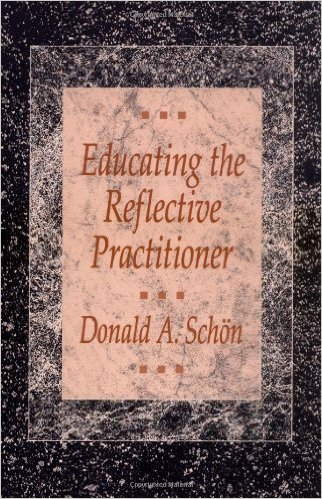
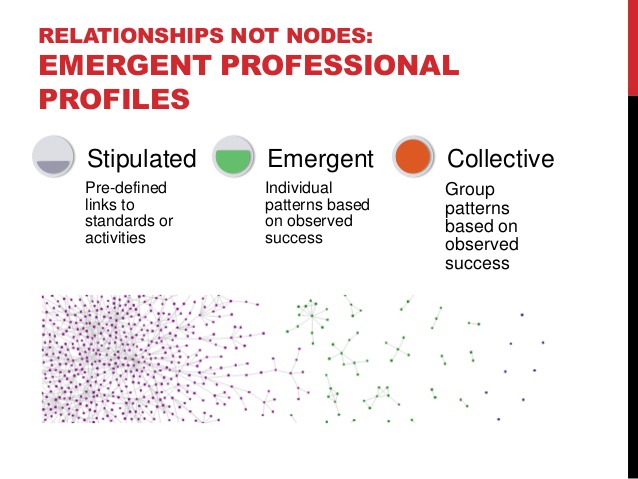
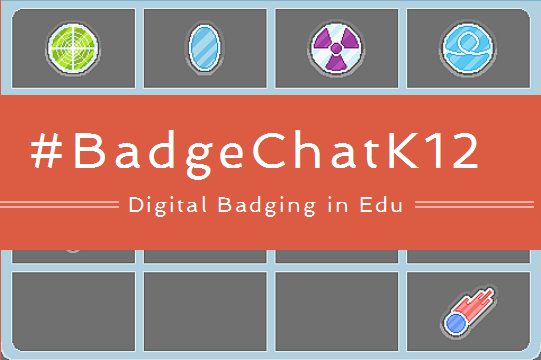
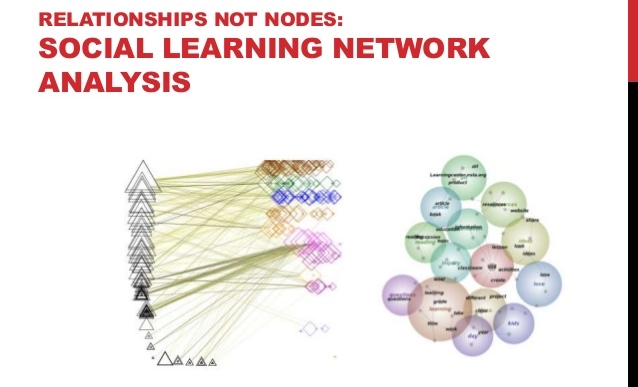

Pingback: Enhancing Aboriginal PD with Open Badge eCredentials | Littoraly